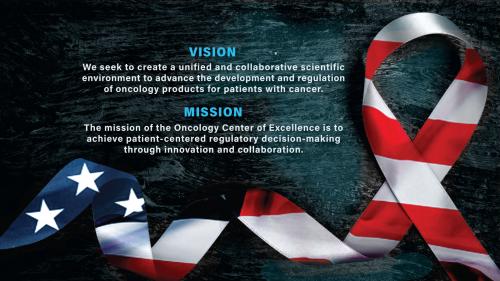OCE Programs and Projects Overview

OCE Programs
Cancer in Older Adults Program works to improve outcomes for older adults with cancer through engagement and research.
Immuno-oncology Therapeutics Program brings together existing expertise within FDA to promote development of new therapeutics that focus on harnessing the immune system to engage new, more efficacious treatment paradigms for patients with cancer.
OCE Scientific Collaborative supports FDA oncology staff who participate in applied regulatory science research projects and collaborations with FDA and external experts.
Oncology Cell and Gene Therapy Program focuses on clinical evaluations for, and helps to expedite development of, transformative cancer therapies based on cutting-edge technologies with curative potential.
Oncology Labeling Program provides an integrated cross-center approach to advance clinically meaningful, data-driven, and scientifically accurate drug information for healthcare practitioners and patients with cancer.
Oncology Real World Evidence Program aims to engage in evidence development modernization through scientific collaboration and policy development to advance the appropriate fit-for-purpose application of RWD to generate RWE for regulatory purposes.
Oncology Regulatory Affairs provides an integrated regulatory approach to enhance the cross-center coordination of oncology product clinical review.
Patient-Focused Drug Development Program fosters collaboration between FDA Centers and external stakeholders involved in patient outcomes research in cancer populations.
Pediatric Oncology Program promotes the development of safe and effective new drugs and biologics to treat cancer in children.
Precision Oncology Program is coordinating and integrating efforts across the centers to catalyze regulatory science research and development to apply new methodologies to deliver the promise of precision oncology for new and better drugs, diagnostics, and biologics to reduce the burden of cancer.
Rare Cancers Program promotes the development of safe and effective new drugs and biologics to treat patients with rare cancers.
OCE Projects
Project 5 in 5 crowdsourcing 5 clinically relevant questions for 5 pragmatic trials.
Project Asha is a collaboration to increase cancer clinical trial access in India.
Project Catalyst provides guidance and educational resources that help support informed anticancer therapy development to expedite the availability of directed and novel cancer treatments to the public, working primarily with small pharmaceutical companies and academic life science incubators and accelerators.
Project Confirm is an initiative to promote the transparency of outcomes related to accelerated approval for oncology indications.
Project Endpoint works to advance the use of endpoints in oncology drug development.
Project Facilitate is a single point of contact call and information center created to help oncology healthcare providers or regulatory professionals submit an Expanded Access Request for an individual patient with cancer through FDA's Expanded Access Program.
Project FrontRunner aims to encourage drug companies to consider the most appropriate line of treatment setting when developing cancer therapies, such as in earlier clinical settings.
Project Livin’ Label is an educational initiative that aims to foster broad understanding of the associated oncology product label and increase awareness of recent oncology drug FDA approvals in the cancer community.
Project Optimus is an initiative to reform the dosage optimization and dosage selection paradigm in oncology drug development.
Project Orbis provides a framework for concurrent submission and review of oncology products among international partners.
Project Patient Voice is an online platform for patients and caregivers along with their healthcare providers to look at patient-reported symptom data collected from cancer clinical trials.
Project Point/Counterpoint provides a new version of the Oncologic Drugs Advisory Committee (ODAC) briefing document that combines the company’s and the FDA’s positions in a single document.
Project Pragmatica seeks to introduce functional efficiencies and enhance patient centricity by integrating aspects of clinical trials with real-world routine clinical practice through appropriate use of pragmatic design elements.
Project Renewal is a public health initiative that aims to update the prescribing information (i.e., labeling) for certain older oncology drugs to ensure information is clinically meaningful and scientifically up to date
Project Significant (Statistics in Cancer Trials) promotes collaboration and engagement among diverse stake holders to further the design and analysis of cancer clinical trials with the goal to advance cancer therapies.
Project Socrates provides educational opportunities for hematology/oncology fellows, basic and translational scientists, junior faculty, and others interested in learning more about regulatory science and drug development.
